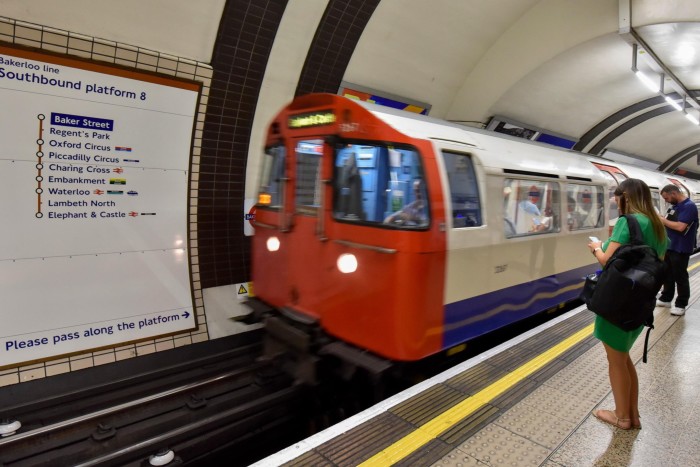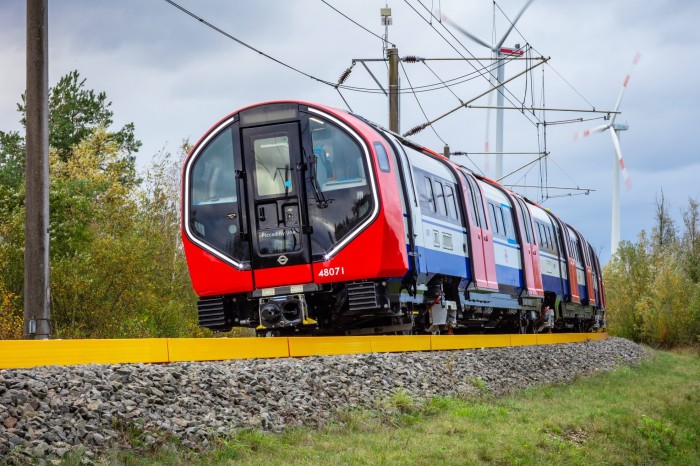The head of Transport for London has called for a long-term funding deal from the UK government to replace 50-year old tube trains and stop parts of the road and rail network from falling into disrepair.
Andy Lord told the Financial Times that he had written to Rachel Reeves to request a financial settlement of up to five years to fund TfL spending on capital projects as part of the Treasury’s spending review in June.
London’s transport authority — which runs the Underground and bus networks, as well as some Overground trains and many major roads — muddled through six short-term bailouts from the previous Conservative government.
“You can’t run the world’s largest integrated public transport authority without a long-term capital funding settlement, in my view,” Lord said in an interview.

One of TfL’s most urgent priorities is replacing the 53-year-old trains that run on the Underground’s Bakerloo line, the oldest carriages in service in the UK.
Lord warned that the line was becoming increasingly unreliable as the authority struggled to maintain trains built in the 1970s.
“There will come a point in time where we simply will not be able to have sufficient trains to run a reliable service, and that will have knock on consequences,” he said. “We will continue to keep it running for as long as we can, but the reality is it will become more expensive and less reliable.”
TfL is on track to achieve an “operating surplus” for the second consecutive financial year, in effect meaning it can pay for the cost of its own operations. But it will need government money for significant capital spending to replace trains, renew signalling or open new infrastructure.

The body was handed £485mn in the October Budget for capital spending in the 2025-26 financial year, but has no clarity over its funding beyond then.
Lord compared TfL’s piecemeal financial settlements to other transport bodies such as Network Rail, the state-owned operator of Britain’s rail infrastructure, and National Highways, which is responsible for motorways. They are given budgets over five-year cycles.
But with the public finances swinging to a smaller than expected surplus in January and pressure to find more money for defence, Reeves is facing an increasingly difficult spending backdrop.
Lord, TfL’s commissioner since 2022, declined to say how much he had asked for. But he warned of the “risk” that parts of the transport network would become less reliable without new cash.

Serious disruption to the Underground’s Central line over the past year was the result of the previous Tory government not fully funding a maintenance programme, Lord said.
He added that some of the major roads operated by TfL, including the Brent Cross flyover in north London, were in need of urgent repairs.
“We’ve got restrictions on a number of core road arteries at the minute, where it’s having a direct impact [on traffic],” he said.
TfL has ordered 94 new trains from German industrial conglomerate Siemens for the Piccadilly line. They are due to enter service next year.
Lord said TfL would like to place a follow-on order for new trains for the Bakerloo line from Siemens, which would also help secure the future of the factory where they are assembled in Goole in Yorkshire.
TfL also wants to re-signal the Piccadilly line to significantly increase the number of trains that can run on the line.

Other options presented by Lord to Reeves included funding major “growth schemes”, including tunnelling the Bakerloo line further into south London, and extending the driverless Docklands Light Railway to Thamesmead in south-east London.
“I’m encouraged by the positive discussions we’re having [about a financial settlement] . . . I am optimistic we will get the necessary funding” Lord said.
Government officials said they were working with TfL on a longer-term settlement. The Department for Transport said: “The success of London’s transport network is vital for both the capital and the UK’s economy.”
With Heathrow expansion back on the agenda after Reeves said the government would back the project, Lord said the government or airport would have to fund the multibillion pound upgrades to existing transport infrastructure needed if a third runway was built.
He said TfL would have to consider extra services on the Elizabeth line rail link and upgrades to the Piccadilly line, both of which run between Heathrow and central London, to cater for the increase in air travellers.

The creation of new rail links to the south and west and road upgrades would also need to be looked at, he added.
“TfL can’t be expected to expand its services into Heathrow out of its own money. We simply don’t have that funding available,” he said.
In a new blow to TfL’s finances, Lord said he expected passenger revenue to be lower than forecast in its current financial year.
He blamed fewer people travelling than expected, and cited the economic environment and evidence showing more jobs were being created in outer than inner London.
TfL’s latest financial figures, published in December, forecast passenger income of £5.3bn for the 2024-25 financial year, £200mn less than forecast.
“I think we’ve got to continue looking at how we can work with employers in particular to encourage people to come into the city more often,” he said.
Lord’s comments echo London Mayor Sir Sadiq Khan, who has warned about the rise in flexible working. This month Khan warned that the capital “cannot afford” to become a city where “the centre has been hollowed out”.
Still, TfL mandates its office-based staff to be in the office only 50 per cent of the time.
“I think a lot of the focus on whether people should be in the office depends very much on the sector you are working in. If you take our business, I want people to be out on the network experiencing what our customers experience,” Lord said.








